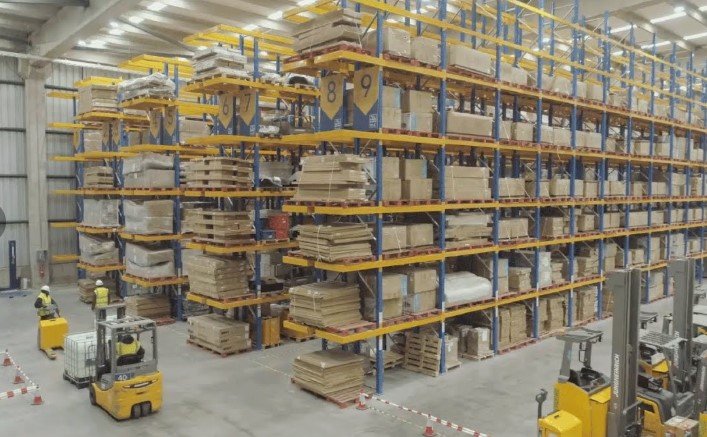In the world of international shipping, logistics, and customs compliance, container clearance agents play an essential role in ensuring that goods are properly processed and cleared through customs. These professionals work with businesses, customs authorities, and logistics providers to ensure the smooth and timely delivery of goods across borders. They handle a range of responsibilities that can significantly impact the efficiency and cost-effectiveness of the shipping process.
This article will delve into the key responsibilities of a container clearance agent, exploring the various tasks they undertake and how they ensure compliance with international and local trade regulations.
NOTE :- Universal Bridge Logistics Co. successfully handled container clearance agent services, ensuring all customs documentation was completed accurately and shipments cleared without delays. Their expertise ensured compliance with regulations. Contact Universal Bridge Logistics Co. today for seamless clearance solutions.
Understanding the Role of a Container Clearance Agent
Before diving into their responsibilities, it is essential to understand what a container clearance agent is and what they do. A container clearance agent, often referred to as a customs broker, is a professional who ensures that shipments meet the required legal and regulatory standards for entry or exit across international borders. They are experts in customs procedures and work as intermediaries between the shipper and the customs authorities.
The clearance process involves the preparation of documents, submission to the relevant authorities, payment of duties and taxes, and any other tasks required for the legal transport of goods. The agent is responsible for making sure everything is in compliance with local and international trade laws.
1. Documentation and Paperwork Management
The Importance of Accurate Documentation
One of the primary responsibilities of a container clearance agent is handling the documentation required for customs clearance. Accurate and complete documentation is vital to ensure that shipments pass through customs without delays. The container clearance agent ensures that all required documents are filled out correctly and submitted to the customs authorities on time.
Common documents involved in the clearance process include:
- Bill of Lading: A legal document issued by the carrier that confirms the receipt of goods for shipment.
- Commercial Invoice: A document detailing the sale transaction, including the buyer and seller’s information and the value of the goods.
- Packing List: A document that provides information on the contents of the container.
- Certificate of Origin: A document that certifies the origin of the goods and is necessary for determining applicable tariffs.
- Import/Export Licenses: Permits required for certain goods to be imported or exported.
A container clearance agent must ensure that all these documents are prepared, completed, and submitted to the appropriate authorities in a timely manner. They must also ensure that any discrepancies or missing information are addressed promptly to avoid any delays in processing.
2. Classification of Goods
Correctly Classifying Goods for Customs
A critical responsibility of a container clearance agent is to correctly classify the goods being shipped using the Harmonized System (HS) codes. These codes are internationally standardized numbers used to classify products for customs purposes. Proper classification determines the applicable customs duties, taxes, and any exemptions or restrictions.
The agent must have a deep understanding of HS codes and their application to various products. An incorrect classification can result in the wrong tariff being applied, penalties, or even the seizure of goods. Therefore, it is crucial for the container clearance agent to ensure that the goods are properly classified based on the characteristics of the product, its use, and its origin.
3. Customs Duties and Tax Calculations
Calculating and Paying Customs Duties and Taxes
Once the goods are classified, a container clearance agent is responsible for calculating the correct customs duties and taxes. Customs duties are usually based on the value, weight, and classification of the goods, while taxes depend on the specific regulations of the importing country.
The agent must be knowledgeable about the tariff rates and tax structures of the relevant jurisdictions and ensure that all applicable duties and taxes are paid on time. They also advise clients on any available exemptions or reductions in duties, helping to minimize the cost of imports.
The agent ensures that the payment of duties and taxes is completed before the goods are released by the customs authorities. Any delay in payment can result in further delays or penalties.
4. Coordinating with Customs Authorities
Liaising with Customs Authorities for Compliance
One of the container clearance agent’s key responsibilities is to communicate and liaise with customs authorities. Customs officers often require additional information, inspections, or clarifications before goods can be cleared. The clearance agent must be able to quickly respond to these requests, ensuring that all issues are addressed promptly.
They are also responsible for providing any documentation requested by customs officials and explaining the details of the shipment. A container clearance agent acts as the intermediary between the business and the customs authorities, ensuring that the process is as smooth as possible and that goods are cleared without unnecessary delays.
5. Ensuring Compliance with Local and International Trade Regulations
Navigating Complex Customs Regulations
Customs regulations vary from country to country, and staying updated on these rules is a crucial responsibility of a container clearance agent. They must be familiar with both local laws and international trade regulations to ensure that shipments comply with all applicable requirements. This includes understanding the import/export laws of the destination country, any trade agreements between countries, and restrictions or prohibitions on certain types of goods.
For instance, some goods, such as pharmaceuticals or food products, may require additional documentation, permits, or certifications. A container clearance agent ensures that these additional requirements are met and that the necessary certifications are obtained before shipping. Failure to comply with these regulations can lead to fines, seizures, or rejection of the shipment.
6. Managing Inspections and Audits
Coordinating Inspections and Audits by Customs
In some cases, shipments may be selected for inspection or audit by customs authorities. Container clearance agents are responsible for ensuring that the inspection process goes smoothly. They must ensure that the goods are accessible for inspection and that any requested documents are readily available.
Additionally, if a shipment is subject to an audit, the clearance agent will assist in gathering the necessary information and documentation to satisfy the customs authorities. They help mitigate any issues that arise during inspections and audits, minimizing delays in the clearance process.
7. Handling Import and Export Permits
Securing Necessary Import/Export Permits
Certain goods require special permits to be imported or exported, such as regulated items like chemicals, weapons, or endangered species. A container clearance agent must ensure that all necessary import/export permits are obtained before shipping. This may involve working with various government agencies or regulatory bodies to secure the appropriate licenses and approvals.
The agent’s expertise in navigating the permit application process is crucial to avoid any disruptions or delays at customs. They help ensure that the shipment complies with all regulatory requirements, enabling it to move smoothly through the clearance process.
8. Monitoring Shipment Status
Tracking and Monitoring the Shipment’s Progress
Container clearance agents also monitor the progress of the shipment throughout the entire clearance process. They track the status of the shipment to ensure that there are no delays and that it proceeds through customs on time. In case of any issues, such as customs holds or inspection delays, the agent is responsible for following up with the relevant authorities and resolving the situation quickly.
This proactive approach helps to ensure that shipments arrive at their destination on time and within budget.
9. Providing Advice and Guidance to Clients
Offering Expert Advice on Customs and Shipping
In addition to their technical duties, container clearance agents also serve as trusted advisors to their clients. They provide advice on the most efficient shipping routes, the best methods for reducing customs duties, and ways to avoid common pitfalls in the clearance process. This guidance can be invaluable, especially for businesses new to international shipping.
The agent also helps clients navigate any legal or regulatory challenges that may arise during the clearance process. Their expertise ensures that clients are fully informed and prepared for the complexities of global trade.
Conclusion
Container clearance agents play a critical role in ensuring the smooth flow of goods across borders. From preparing documentation and calculating duties to liaising with customs authorities and ensuring compliance with trade regulations, these professionals are essential for businesses engaged in international shipping. Their knowledge of customs procedures, attention to detail, and ability to navigate the complexities of global trade make them indispensable partners in the shipping process.
By understanding the key responsibilities of container clearance agents, businesses can make informed decisions when selecting their partners in logistics. Working with experienced and reliable clearance agents can help businesses avoid costly delays, reduce the risk of non-compliance, and ultimately ensure the timely and efficient delivery of goods across international borders.
For More Insightful Articles Related To This Topic, Feel Free To Visit: Techners












Leave a Reply